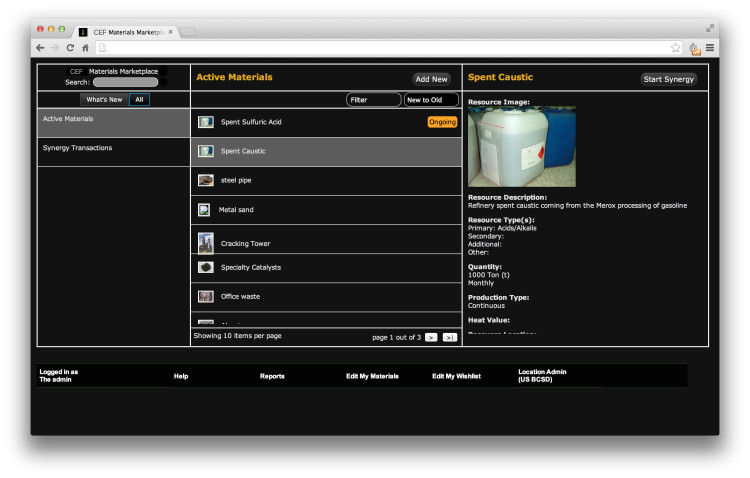
Online marketplace allows companies to exchange underutilized materials, turning one company’s waste into raw material for the other.
July 8, 2015: The National Materials Marketplace is a new joint pilot project led by the Corporate Eco Forum (CEF), US Business Council for Sustainable Development (US BCSD), and the World Business Council for Sustainable Development (WBCSD). Bringing together more than 20 major companies with operations in the United States, the project will help participants identify ways to reuse or exchange undervalued materials via an online database, and establish new circular supply chains.
“The increasing pressure on our natural resources sends a clear message: we need to find value in discarded materials. Growing cross-industry collaboration for the efficient use of our resources is promising. This opens up new business opportunities while creating economic, environmental, and societal benefits,” says Andrew Mangan, Executive Director of US BCSD.
“The Materials Marketplace project is a key step towards the shift to a circular economy – one where waste becomes the new engine for creating value,” says Peter Bakker, President and CEO of the WBCSD.
“Unlocking business-to-business reuse opportunities ensure effective waste management and deliver integrated benefits.”
The potential benefits of matching material and by-product waste streams with opportunities for reuse are massive. In recent years, General Motors has generated nearly $1 billion in annual revenue through reusing and recycling its by-products. By finding reuse and recycling options for this material, GM avoided over 10 million metric tons of CO2-equivalent emissions in 2014.

“Material management is a business opportunity, not just a cost-reduction strategy,” adds John Bradburn, GM’s Global Manager of Waste Reduction. “We have to reach the stage where by-products are viewed the same way we view product development – part of constant improvement and innovation.”
The Marketplace is a unique collaboration among the three business associations. Originally conceived at a CEF member meeting, the idea gained momentum with the support of early advocates including GM and Nike. The national pilot builds upon a similar regional project in Austin, Texas, as well as other “by-product synergy” projects in North America, China and the United Kingdom over the past 20 years.
Amy O’Meara, Director of the Corporate Eco Forum explains: “US BCSD’s expertise and software were exactly what our members were looking for. And joining forces with US BCSD and WBCSD was a natural fit, given the significant complementarity of our memberships. By leveraging each of our organizations’ strengths, we can deliver increased value to participating companies.”
By joining the pilot, participating businesses benefit from:
-
Lower operational costs due to cheaper feedstock and reduced waste disposal costs
-
Reduced carbon footprint owing to major cuts in energy use and GHG emissions
-
Reduced environmental footprint by avoiding waste disposal and raw material purchase
-
Enhanced social and economic impact through new business opportunities and jobs
-
Improved corporate reputation through the reporting of reuse activities and diversion of waste streams for productive purposes
-
A collaborative and dynamic business network allowing for exploration of new pathways for materials with other like-minded colleagues.
Lessons learned from the pilot will be used to scale up materials reuse projects worldwide, notably through the WBCSD’s Global Network of national business councils.
Participating companies include: 3M; Armstrong World Industries; CH2M; Eastman Chemical; Essroc – Italcementi Group; Fairmount Santrol; General Motors; Goodyear; Holcim-Geocycle; Nike; Novelis – Aditya Birla Group; The Dow Chemical Company; Tetra Pak Inc.; Swisstrax; Systech; and many others.
###
For more information, please contact:
Irge Olga Aujouannet
WBCSD Communications
aujouannet@wbcsd.org
+41 22 839 3129
Daniel Kietzer
US BCSD Communications
kietzer@usbcsd.org
+1 512-964-5401
Amy O’Meara
Corporate Eco Forum
amy@corporateecoforum.com
+1 857-222-8270
Notes to Editors
About the US BCSD
The US BCSD is an action oriented and member-led business association that harnesses the power of collaborative projects, platforms and partnerships to develop, deploy and scale solutions to ecosystems, energy, materials and water challenges. US BCSD activities are designed to generate economic returns and address environmental and societal challenges. The US Business Council is one of 70 national councils worldwide associated with the World Business Council for Sustainable Development, a network of 200 companies with members drawn from 30 countries and 20 major industrial sectors.
About CEF
The Corporate Eco Forum (CEF) is an elite, invitation-only membership organization comprised mainly of Fortune and Global 500 companies from 18 industries with combined revenues of over $3 trillion. CEF provides a year-round safe, neutral space for influential executives to exchange best practice, collaborate, and innovate. Participants are almost exclusively VP and C-level executives across multiple business functions including CSOs, CTOs, CIOs, CFOs, CMO, and VPs for Supply Chain. The diversity of executives, coupled with the cross-industry nature of CEF, creates a world-class platform to accelerate sustainable business problem solving and innovation. www.corporateecoforum.com and @CEFecoforum
About the World Business Council for Sustainable Development (WBCSD)
The World Business Council for Sustainable Development (WBCSD), a CEO-led organization of some 200 forward-thinking global companies, is committed to galvanizing the global business community to create a sustainable future for business, society and the environment. Together with its members, the Council applies its respected thought leadership and effective advocacy to generate constructive solutions and take shared action. Leveraging its strong relationships with stakeholders as the leading advocate for business, the Council helps drive debate and policy change in favor of sustainable development solutions.
The WBCSD provides a forum for its member companies – who represent all business sectors, all continents and a combined revenue of more than $8.5 trillion, 19 million employees – to share best practices on sustainable development issues and to develop innovative tools that change the status quo. The Council also benefits from a network of 70 national and regional business councils and partner organizations, a majority of which are based in developing countries. www.wbcsd.org
